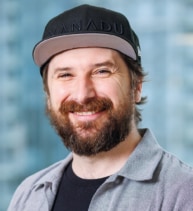Ask me anything: Rafal Janik – ‘We want to build quantum computers that are useful and available to people everywhere’
09 Dec 2022 Sarah Tesh
Rafal Janik is the chief operating officer at the photonic quantum technology company Xanadu in Toronto, Canada. Founded in 2016, Xanadu has become one of the world’s leading quantum hardware and software companiesLessons learnt Rafal Janik says it’s crucial to “build relationships, reach out and be brave if you want to further your career”. (Courtesy: Xanadu)
What skills do you use every day in your job?
Before becoming chief operating officer, I led the machine-learning and product teams at Xanadu. Taking on multiple roles previously has given me the skills to succeed in my current role. Working closely with each team at the company has been instrumental in my ability to understand their unique needs and work cross-functionally to manage day-to-day operations. Skills that are crucial to my role include leadership, communication, programme management, relationship management and the ability to assimilate new information.
To that end, the number one skill to have is adaptability. Whether it’s contract law, finance or trying to understand how different parts of the tech stack work, it’s important to be adaptable and able to pick up new things quickly. At Xanadu, and perhaps at any early-stage company, you need general flexibility, the drive to learn and implement new skills to meet business needs, and the ability to delegate and empower team members to make decisions and take ownership.
What do you like best and least about your job?
One thing I really enjoy is that Xanadu is mission-driven – we want to build quantum computers that are useful and available to people everywhere. We discuss our aims regularly and make sure we hire people who are passionate about what they do, seek to learn every day, build strong relationships and communicate effectively. Building a scalable quantum computer that people can use to solve real-world problems is no easy feat, but fortunately I have an incredible team and working with them is by far the best thing about my job.
The other thing I really enjoy – which is also really difficult – is that I’m always doing something new. My day-to-day tends to be full of very different tasks and I can’t say I’m ever bored. But at the same time, this can be incredibly challenging.
One of the hardest parts of the job is that everything we’re doing is new. We’re solving problems that people haven’t even thought of yet, and not only from a technical perspective. There are no books on how to show the value of quantum computing to enterprise customers or to describe to them why quantum computing matters to a company like theirs. And you can’t just rely on the expertise you’ve gathered previously in your career to do the job; you always need to be learning as you go.
What do you know today that you wish you knew when you were starting out in your career?
I really wish that I knew, even before I started university, that if you simply call, reach out or email people in the field they will be willing to help. If you’re interested in a particular area, the worst thing you can do is just not try. We have lots of people at Xanadu that have managed to become part of the industry despite the many roadblocks that may have existed either in their minds or in reality. This is mainly because they’ve been brave enough to showcase their work and talent, whether it be through contributing to our open-source projects or engaging with us through events like QHack. And that’s one thing I was always too shy to do. I thought that you go to university, then send your resume out, get a job and continue on that path. But as I’ve gone through my career, I’ve learned that it’s much more important to build relationships, reach out and be brave if you want to further your career or change anything about the world at all.

Sarah Tesh is features editor of Physics World
from physicsworld.com 12/12/2022

Δεν υπάρχουν σχόλια:
Δημοσίευση σχολίου